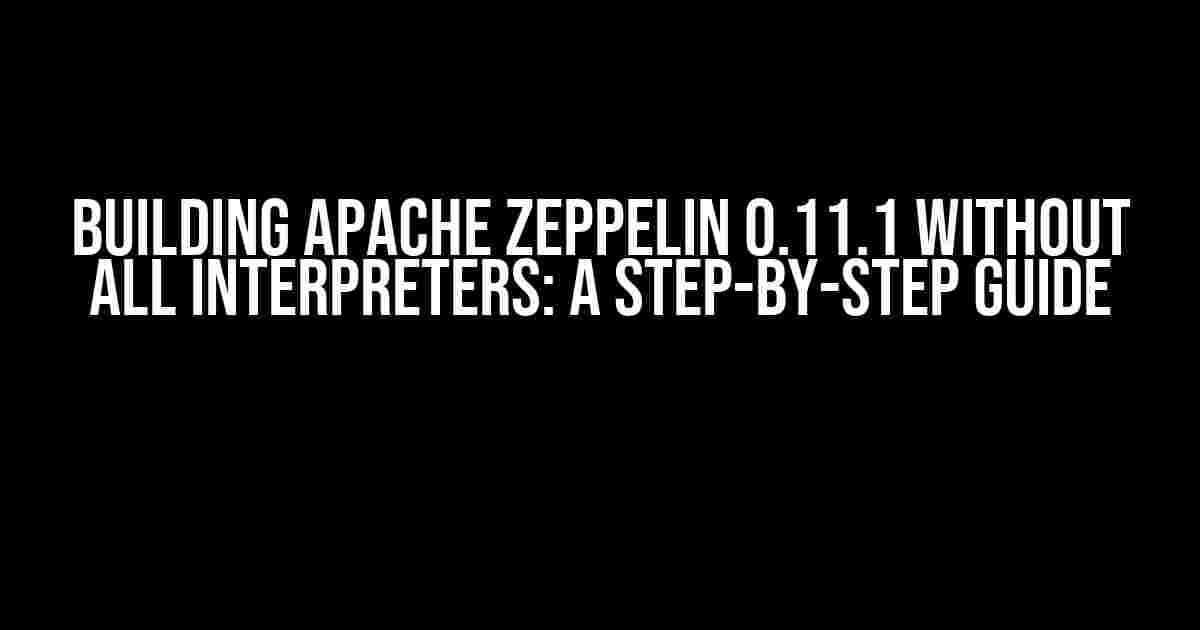Apache Zeppelin is a popular web-based notebook platform for data exploration, visualization, and collaboration. By default, Zeppelin comes with a wide range of interpreters, including Apache Spark, Python, R, and more. However, in some cases, you might want to build Zeppelin with only a specific set of interpreters, or even without any interpreters at all. This article will walk you through the process of building Apache Zeppelin 0.11.1 without all interpreters.
Why Build Zeppelin without Interpreters?
There are several reasons why you might want to build Zeppelin without all interpreters:
- Customization**: You might want to customize Zeppelin to fit your specific use case, and only include the interpreters that are relevant to your project.
- Security**: By removing unnecessary interpreters, you can reduce the attack surface of your Zeppelin installation.
- Performance**: Building Zeppelin without all interpreters can lead to a more lightweight and efficient application.
- Dependency management**: By excluding certain interpreters, you can avoid conflicts with other dependencies in your project.
Prerequisites
Before we dive into the build process, make sure you have the following prerequisites installed on your system:
Java 8or higherMaven 3.5.4or higherGit- A suitable IDE or text editor
Cloning the Zeppelin Repository
To start, clone the Apache Zeppelin repository using the following command:
git clone https://github.com/apache/zeppelin.gitThis will download the entire Zeppelin repository to your local machine.
Configuring the Build Process
Navigate to the Zeppelin repository directory and create a new file called zeppelin.profile. This file will contain the configuration settings for the build process.
cd zeppelin
touch zeppelin.profileAdd the following lines to the zeppelin.profile file:
# Disable all interpreters
Zeppelin.Interpreter.Default=false
# Disable dependencies for specific interpreters
zeppelin.interpreter.dependency.spark=false
zeppelin.interpreter.dependency.python=false
zeppelin.interpreter.dependency.r=false
...
In this example, we’re disabling all interpreters and their dependencies. You can customize this file to include or exclude specific interpreters as needed.
Building Zeppelin without Interpreters
With the zeppelin.profile file in place, you’re ready to build Zeppelin without all interpreters. Run the following command:
mvn clean package -Pbuild-without-interpretersThis command will build Zeppelin with the configuration settings specified in the zeppelin.profile file.
Building Zeppelin with Specific Interpreters
If you want to build Zeppelin with a specific set of interpreters, you can modify the zeppelin.profile file accordingly. For example, to build Zeppelin with only the Apache Spark interpreter, add the following lines:
# Enable Spark interpreter
zeppelin.interpreter.dependency.spark=true
# Disable all other interpreters
zeppelin.interpreter.dependency.python=false
zeppelin.interpreter.dependency.r=false
...
Then, run the same mvn command as before:
mvn clean package -Pbuild-without-interpretersVerifying the Build
After the build process is complete, you can verify that Zeppelin has been built without all interpreters by checking the target directory:
cd target
lsYou should see a list of files and directories, including the Zeppelin WAR file (zeppelin-web-0.11.1.war).
Deploying Zeppelin
To deploy Zeppelin, you’ll need to create a web application server, such as Apache Tomcat. Copy the Zeppelin WAR file to the Tomcat webapps directory:
cp target/zeppelin-web-0.11.1.war /usr/local/tomcat/webapps/Start Tomcat, and Zeppelin will be available at http://localhost:8080/zeppelin.
Troubleshooting
If you encounter issues during the build process, check the Maven logs for errors or warnings:
mvn clean package -Pbuild-without-interpreters --debugThis will provide more detailed output to help you diagnose the problem.
Conclusion
In this article, we’ve covered the steps to build Apache Zeppelin 0.11.1 without all interpreters. By customizing the zeppelin.profile file, you can tailor Zeppelin to your specific needs and create a more lightweight and efficient application. Remember to verify the build and troubleshoot any issues that may arise during the process.
| Keyword | Description |
|---|---|
| Apache Zeppelin | A web-based notebook platform for data exploration, visualization, and collaboration |
| Interpreters | Components that enable Zeppelin to interact with specific data sources and execute code |
| Maven | A build automation tool for Java-based projects |
| Git | A version control system for managing code repositories |
| zeppelin.profile | A configuration file that specifies build settings for Zeppelin |
By following this guide, you should now have a custom-built Zeppelin installation without all interpreters. Happy building!
Frequently Asked Question
Get ready to dive into the world of Apache Zeppelin 0.11.1 without all interpreters! Here are some frequently asked questions to help you navigate this exciting journey.
Q: Why would I want to build Apache Zeppelin 0.11.1 without all interpreters?
Sometimes, you might not need all the interpreters that come with Apache Zeppelin 0.11.1, and building without them can save you space and resources. Plus, it’s always good to have control over what’s included in your build!
Q: How do I specify which interpreters to include or exclude during the build process?
You can specify which interpreters to include or exclude by using the `-P` option followed by the name of the interpreter. For example, `-Pspark` would include the Spark interpreter, while `-P-spark` would exclude it. You can list multiple interpreters separated by commas, like `-Pspark,python`.
Q: Can I build Apache Zeppelin 0.11.1 without any interpreters at all?
Yes, you can! By using the `-Pnone` option, you can build Apache Zeppelin 0.11.1 without any interpreters. This can be useful for building a minimal Zeppelin installation or for testing purposes.
Q: Will building without all interpreters affect the functionality of Apache Zeppelin 0.11.1?
Building without all interpreters will only affect the availability of those specific interpreters. Apache Zeppelin 0.11.1 will still function as expected, but you won’t be able to use the excluded interpreters. If you need to use a particular interpreter later, you can always build Zeppelin again with the desired interpreter included.
Q: Where can I find more information about building Apache Zeppelin 0.11.1 with customized interpreters?
You can find more information about building Apache Zeppelin 0.11.1 in the official Apache Zeppelin documentation, specifically in the “Building Zeppelin” section. Additionally, you can explore the Zeppelin community forums and online resources for more tips and guidance on customizing your Zeppelin build.

